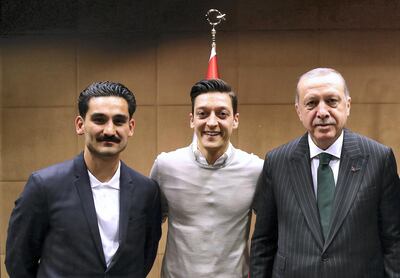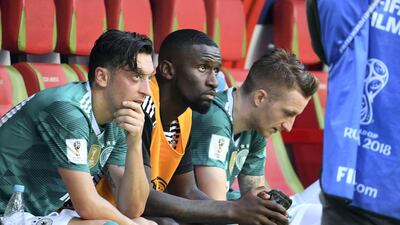The head of Germany’s Muslim community has called on football officials to resign after they blamed Turkish-born player Mesut Ozil for the team’s humiliating exit from the World Cup.
Aiman Mazyek said the president of the German football association, Reinhard Grindel, and the general manager of the national team, Oliver Bierhoff, were singling out Ozil because they could get away with it in the current anti-Muslim climate.
“Putting the boot in is punished with a red card in sports,” Mr Mazyek, chairman of the Central Council of Muslims in Germany, told ESPN.
“Bierhoff and Grindel must step down if they have not learnt anything else in their long career than ‘You lose as Ozil’ instead of ‘You lose as a team’.”
He said their criticism was only tolerated because public sentiment towards immigrants and Muslims had soured after the refugee influx.
“If this did not have a strong bias right now, both officials would have long been gone following their underwhelming statements,” Mr Mazyek said.
Ozil, 29, a midfielder and mainstay of the team since 2009, has been under fire in Germany since May when he and teammate Ilkay Gundogan met Turkish President Recep Tayyip Erdogan at an event in London and posed for photos with him.
It was less than a month before the start of the World Cup and just a few weeks before the Turkish election.
Critics said the two had betrayed loyalties by meeting a leader vilified by many in Germany for his autocratic style of government and disregard for civil liberties.
Gundogan even handed the president a football shirt signed with the words: “With respect for my president.”

Both players were born in the western city of Gelsenkirchen to immigrants and the images of them smiling next to Mr Erdogan highlighted Germany’s failure to integrate the three million people of Turkish origin living there.
The Turks arrived there half a century ago as “guest workers” invited by companies that were desperately short of manpower after the Second World War.
Even Chancellor Angela Merkel criticised the players’ appearance with Mr Erdogan. Her spokesman said it “raises questions and invites misunderstanding.”
Gundogan, who plays in Britain for Manchester City, responded by saying that the players had never intended to make a political statement or to imply that Mrs Merkel was not their chancellor.
But Ozil has declined to comment on the matter, making him more vulnerable to criticism.
Mr Bierhoff has said that the German football association should have considered “doing without him from a sporting point of view”.
Mr Grindel called on Ozil to make a public statement when he returned from his vacation and implied that if he did not, his future in the national team would be in doubt.
The German team members are role models for millions, especially for the boys and girls for whom the sport is a way of life in the football-mad country.
The team has become more racially mixed over the past decade, reflecting Germany’s growing diversity.
The immigrant players are crucial because they can convey a sense of national belonging among communities still struggling to be accepted in a society where non-whites are still often viewed as foreigners.
The controversy surrounding Ozil coincides with a surge in support for the far-right Alternative for Germany party that has benefited from voter anger at Mrs Merkel’s open-door refugee policy. About 1.6 million migrants have entered Germany since 2014.
AfD politicians have railed against the two Turkish players. After Germany crashed out of the World Cup by failing to make it through the group stage for the first time, AfD member of parliament Jens Maier tweeted a photo of a smiling Ozil with the caption, “Are you pleased, my president?”
He also said, “Without Ozil we would have won.”
Ozil was no more lacklustre than the rest of the ageing team who went into the tournament ill-prepared and over-confident, and suffered the fate of many previous World Champions who do badly.
Team coach Joachim Low, has been allowed to stay. “The handling of the Ozil-Gundogan case has the potential to endanger what this national team has embodied in recent years – integration can succeed,” said Dagmar Freitag, the head of parliament’s sports committee.
Critics said the German association should have followed the example of the Swedish squad, which stood by its midfielder Jimmy Durmaz, born in Sweden to Assyrian parents who emigrated from Turkey, after he suffered a tirade of online abuse for a foul that led to the free-kick from which Germany scored the winning goal in their World Cup match.
They delivered a statement to the media condemning the hate and racism.

